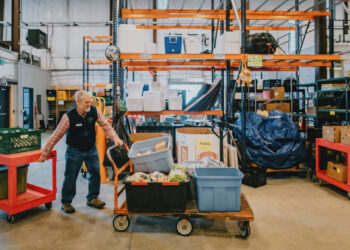A faction of 32 Democrats had endorsed polling the Legislature on a special session before gridlock in Washington began to loosen.
By Mara Silvers MONTANA FREE PRESS
A faction of Montana Democratic lawmakers is holding off on pushing for a special legislative session to address delayed food assistance as Congress inches closer to a deal to end the historically long federal government shutdown.
But members of the minority party said Monday they’re ready to relaunch the effort if regular food assistance doesn’t quickly land in the pockets of low-income residents.
“Today, we’re holding off. Tomorrow might be different,” said Sen. Mary Ann Dunwell, D-Helena.
Back and forth in D.C. and the federal courts has led to confusion over when routine benefits may be paid out, even if the government reopens quickly.
Dunwell and other Democrats said they began exploring the possibility of a special session weeks ago after learning that Republican Gov. Greg Gianforte would not use available contingency funds in the state budget to backfill lapsed Supplemental Nutritional Assistance Program, or SNAP, benefits. The Legislature adjourned in April and is not set to gavel back in until January 2027.
State law requires a threshold of 30 lawmakers to poll the rest of the Legislature on whether to hold a special session. Dunwell and Rep. Mary Caferro, D-Helena, two lawmakers spearheading the effort, say they have support from 32 members to poll the rest of the Legislature. A majority of the body’s 150 members, or 76 lawmakers, would have to agree to call the Legislature back into session — Democrats in both chambers hold 60 of those votes.
In the more than 30 special sessions in the history of the Montana Legislature, only one has been called by lawmakers. The rest were called by the governor, or in one case, both the governor and the Legislature together.
A spokesperson for Speaker of the Montana House Brandon Ler, a Republican from Savage, declined to comment Monday on the Democrats’ efforts, citing movement in Congress over the weekend to pass a continuing resolution to fund the government through January. A group of Democratic U.S. senators appeared poised to vote with Republicans on the measure, splintering from other members of the party who have been holding out for funding for health care subsidies.
Rep. George Nikolakakos, a Great Falls Republican legislator who had previously questioned the Gianforte administration’s handling of the lapse in food aid earlier in the shutdown, said Monday that he was glad to see Congress moving toward reopening the government. But even if the deal fell apart, Nikolakakos said, he wasn’t convinced that calling a special session would be an effective way to deal with the issue of interrupted federal programs.
“You have to be making the decisions at the right level,” Nikolakakos said, referring to Congress’ responsibility to fund the federal government.
Despite the local impact of lapsed programs, Nikolakakos continued, he can understand why the governor held firm on not backfilling the food aid program. “He’s not the one shutting the government down,” he said.
Thirty-six states have taken some action to supplement SNAP benefits or increase funding to food banks. Montana is one of the states that has not, inaction that Democratic lawmakers have criticized as inexcusable because of existing funds they say could be used for exactly this scenario.
“We passed a bill that said, ‘Mr. Governor, here’s money to backfill cuts to federal programs. We’re giving you that authority.’ And yet, the governor refuses to do so,” said Rep. Josh Seckinger, D-Bozeman, during a virtual press conference Monday. “It’s just infuriating from my perspective. Where did the compassionate conservatives go? They vanished.”
The federal U.S. Department of Agriculture under President Donald Trump had previously decided it would not use emergency funds for the federal food assistance program that serves more than 41 million Americans, including 77,000 Montanans.
The USDA changed its approach in early November after federal courts ordered the Trump administration to use emergency funds to fund SNAP. The federal agency opted to issue partial benefits, citing limited funds, and later sought to claw back funds from states that had issued full benefits.
The Montana state health department said Monday that it had issued partial SNAP funds to beneficiaries on Nov. 9, and that recipients should check their electronic benefits card for their available balance.
In an appearance before an interim committee of lawmakers in early November, Department of Public Health and Human Services Director Charlie Brereton said the agency had been considering using available funds from the federal Temporary Assistance for Needy Families, or TANF, program to backfill food aid. But after receiving the updated notice that the USDA would release partial funding for the SNAP program in accordance with federal court rulings, Brereton said the department had pivoted to complying with that plan.
State food aid advocates have said that partial funding would still likely leave many Montanans without sufficient food aid during November and strain local food banks’ supply.
As for future distributions of food aid, some Montana Democrats say they’re not confident that the federal government will promptly return to normal operations, even if federal lawmakers rapidly pass a budget resolution.
“We are very hopeful that the government acts quickly and takes care of this issue as soon as possible. However, there is very much uncertainty within the federal government. They’re unpredictable and we really can’t count on them,” said Caferro, during the Monday press conference. “If things don’t happen quickly in this urgent situation, we will be submitting the petition [for a special session].”
Not all Democrats were aligned with pushing for a special session, Caferro and Dunwell acknowledged, highlighting the difficulty of advocating for policy change as a minority party.
Absent from the list of signatories was Democratic Minority Leader Pat Flowers, who made a name for himself during the 2025 session for aligning his caucus with a faction of Republican senators to pass major pieces of legislation favored by the governor’s office.
In a Monday phone interview, Flowers did not directly criticize Democrats pushing for a special session, but also did not endorse the maneuver.
“At this point, it’s too early to tell whether that’s the appropriate strategy,” Flowers said.
Asked if he would support a later special session vote if food aid or other federal programs continued to see disruptions, Flowers said that would “depend on the circumstances.”
“It may be the path forward, but at this point, there are just too many variables, too many possibilities,” he added.
Zeke Lloyd contributed reporting.














